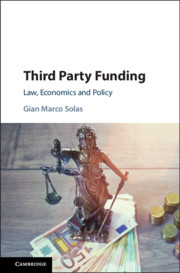Book contents
- Third Party Funding
- Third Party Funding
- Copyright page
- Dedication
- Contents
- Acknowledgements
- Abbreviations
- 1 Introduction
- Part I A Comparative Overview
- Part II An Economic Analysis
- 4 The Emergence of the Litigation Market and TPF
- 5 An Economic Analysis of TPF
- 6 Social Impact of TPF
- Part III Contractual, Regulatory and Policy Considerations
- Bibliography
- Index
4 - The Emergence of the Litigation Market and TPF
from Part II - An Economic Analysis
Published online by Cambridge University Press: 16 September 2019
- Third Party Funding
- Third Party Funding
- Copyright page
- Dedication
- Contents
- Acknowledgements
- Abbreviations
- 1 Introduction
- Part I A Comparative Overview
- Part II An Economic Analysis
- 4 The Emergence of the Litigation Market and TPF
- 5 An Economic Analysis of TPF
- 6 Social Impact of TPF
- Part III Contractual, Regulatory and Policy Considerations
- Bibliography
- Index
Summary
This chapter explains how the litigation market has emerged, starting from the process of liberalisation of the market, and considering a series of trends that have affected the administration of justice and the legal sector in the last decades. This has also given the chance to discuss how litigious rights have been created as a new asset class. This chapter describes who are the actors that are more likely to compete in this market and their modus operandi, with a focus, for obvious reasons, on third party funders. More particularly, this focus helps to distinguish a series of TPF models that have emerged in practice, dividing them into two main groups: passive and active funding. The chapter also discusses how lawyers and insurers maintain litigation, but mainly distinguishes their role from that of third party funders, and explains why the latter have emerged as a stand-alone sector.
- Type
- Chapter
- Information
- Third Party FundingLaw, Economics and Policy, pp. 125 - 166Publisher: Cambridge University PressPrint publication year: 2019

